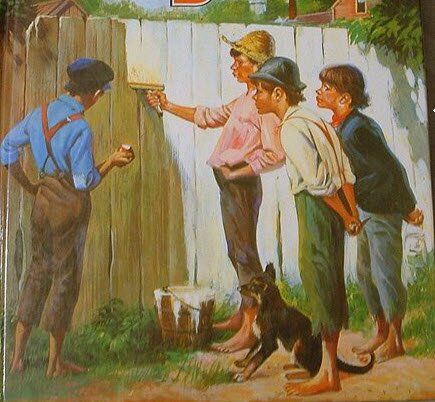 Tom Sawyer looked at the 810 square feet of Aunt Polly’s fence he had been assigned to whitewash and, “Life to him seemed hollow, and existence but a burden,” writes Mark Twain. Tom looked down at the bucket of paint and then up the street to see none other than his good friend Ben sauntering up the sidewalk.
Tom Sawyer looked at the 810 square feet of Aunt Polly’s fence he had been assigned to whitewash and, “Life to him seemed hollow, and existence but a burden,” writes Mark Twain. Tom looked down at the bucket of paint and then up the street to see none other than his good friend Ben sauntering up the sidewalk.
Tom dipped the brush in the paint and began—enthusiastically. When his friend approached, to ask what he was doing, Tom almost ignored him. This triggered Ben’s curiosity. When Ben asked if he might try, Tom told him no. It wasn’t until Ben bribed Tom with an apple that Tom reluctantly relinquished his brush and let Ben have a turn at painting the fence.
It wasn’t long before Tom had a long line of friends begging for the opportunity to paint the fence. Twain writes, “Work consists of whatever a body is obliged to do, Play consists of whatever a body is not obliged to do.”
Why did Tom’s friends want to paint his fence, while Tom, himself was loath to? The secret lies in a concept called, Autonomy. While Tom was assigned to the task, his friends chose it of their own free will.
Twain continues, “There are wealthy gentlemen in England who drive four-horse passenger-coaches twenty or thirty miles on a passenger line, in the summer, because the privilege cost them considerable money,” Twain writes. “But if they were offered wages for the service, that would turn it into work and they would resign.”
As I wrote last week, it isn’t only Twain who understands the counter-intuitive nature of external motivation. Scientists have long known the negative effects of carrot and stick tactics–such as rewards and incentives–for work related performance. Decades of psychological study bear out the fact that rewards often decrease both motivation and performance.
Why? To be clear, we need to understand that it isn’t the rewards themselves that are the trouble. It’s the expectation of the reward for performance. It’s only contingent rewards—“if-then” rewards—that are the problem. The reason? The reward removes autonomy or a sense of control. Ownership. Like the gentlemen driving the carriages for money instead of fun, the reward creates a situation in which the drivers are no longer in full control. This loss of control saps motivation.
New scientific discoveries however, are often controversial. And this continues to be the case when it comes to motivation. After all, these findings fly directly in the face of what many consider common sense in most companies and schools. This new information was so counter-intuitive that in 1999, Edward Deci, Professor of Psychology in the Social Sciences at the University of Rochester, was called upon to analyze nearly three decades of research on the subject of motivation in order to determine if this was really true. Do “if-then” rewards really harm long-term performance?
“Careful consideration of reward effects reported in 128 experiments lead to the conclusion that tangible rewards tend to have a substantially negative effect on intrinsic motivation,” he writes. “When institutions—families, schools, businesses, and athletic teams, for example—focus on the short-term and opt for controlling people’s behavior, they do so at the risk of considerable long term damage.”
In his bestselling book, “Drive: The Surprising Truth About What Motivates Us,” Daniel Pink hammers the point home for both children and adults when he writes:
“Try to encourage a kid to learn math by paying her . . . and she’ll become more diligent in the short term but loose interest in math in the long term. Take an industrial designer who loves his work and try to get him to do better by making his pay continent on a hit product—and he’ll . . . become less interested in his job in the long term.”
“This is one of the most robust findings in social science,” Pink continues. “And also one of the most ignored.”
I know old habits and ideas die hard, but what’s more important: being right or being successful? Parents, teachers, managers, and employers–I ask you only this: Are you going to hang on to old beliefs about how best to motivate? Or are you going to get that fence painted?
Founder of WeTeachWeLearn.org, Chris Wondra is just another Wisconsin public school teacher. Email Chris at: mrwondra@weteachwelearn.org.







Recent Comments